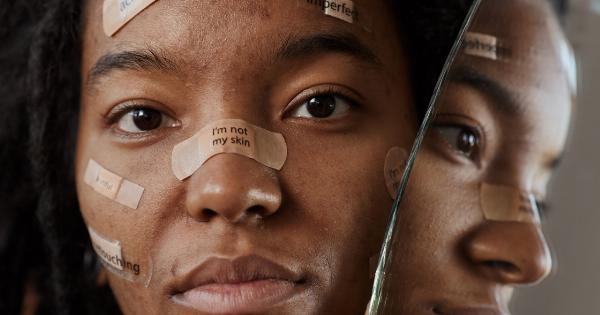Acne is a common skin condition that affects millions of people worldwide. It occurs when the hair follicles become clogged with oil, dead skin cells, and bacteria, resulting in redness, inflammation, and breakouts.
While there are numerous over-the-counter and prescription treatments available, some natural remedies can also help combat acne effectively. One such natural remedy is vinegar.
What is Vinegar?
Vinegar is a versatile liquid made from fermented ethanol by acetic acid bacteria. It has been used for centuries for various purposes, including culinary, household cleaning, and even medical applications.
It is produced through a two-step fermentation process: alcoholic fermentation, where yeast transforms sugar into ethanol, followed by acetic acid fermentation, where bacteria convert ethanol into acetic acid. This acetic acid content gives vinegar its distinct sour taste and strong odor.
Vinegar and Acne
The acetic acid present in vinegar exhibits antimicrobial properties, making it effective against acne-causing bacteria.
Additionally, vinegar helps balance the skin’s pH levels and promotes exfoliation, reducing the occurrence of clogged pores and breakouts. It also possesses anti-inflammatory properties that can soothe inflamed and irritated skin. All these factors combined make vinegar an excellent natural remedy to combat acne.
Types of Vinegar
There are several types of vinegar available, but not all are suitable for acne treatment. It is crucial to choose the right type to ensure maximum efficacy and safety.
1. Apple Cider Vinegar (ACV)
Apple cider vinegar is the most popular type of vinegar for acne treatment. It is made by fermenting apple cider to produce acetic acid-rich vinegar.
ACV contains various vitamins and minerals, including vitamin C and potassium, which are beneficial for skin health. Its acidic nature helps restore the skin’s natural pH, reducing the growth of acne-causing bacteria. ACV can be applied topically or consumed orally as a diluted solution.
2. White Vinegar
White vinegar, also known as distilled vinegar, is another type of vinegar often used for cleaning purposes. While it can also be used topically on acne-prone skin, it is less popular for acne treatment compared to ACV due to its harsh nature.
White vinegar has a higher acidity level, which may cause skin irritation in some individuals. Therefore, it is advisable to do a patch test before using white vinegar on the face.
3. Other Vinegar Varieties
In addition to apple cider vinegar and white vinegar, there are other vinegar varieties like balsamic vinegar, red wine vinegar, and rice vinegar.
However, these types of vinegar are less commonly used for acne treatment due to their flavor profiles or specific uses in culinary applications.
How to Use Vinegar for Acne Treatment
When using vinegar as an acne treatment, it is important to properly dilute it to avoid skin irritation and damage. Here are some ways to use vinegar for acne treatment:.
1. Topical Application
Step 1: Start by diluting vinegar with water in a 1:3 ratio. For example, mix one part vinegar with three parts water.
Step 2: Cleanse your face with a mild cleanser and pat it dry.
Step 3: Using a cotton ball or pad, apply the diluted vinegar solution to the affected areas of the skin.
Step 4: Leave it on for about 10-15 minutes before rinsing it off with lukewarm water.
Step 5: Pat your skin dry and follow up with a suitable moisturizer.
2. Vinegar Toner
Step 1: Mix one part vinegar with two parts water to create a vinegar toner solution.
Step 2: After cleansing your face, pour a small amount of the vinegar toner onto a cotton pad or ball.
Step 3: Gently swipe the cotton pad across your face, focusing on acne-prone areas.
Step 4: Allow your skin to absorb the toner before proceeding with the rest of your skincare routine.
3. Oral Consumption
In addition to topical application, consuming diluted vinegar orally may also help in treating acne from within.
However, it is essential to consult a healthcare professional before incorporating vinegar into your diet as there could be potential interactions or contraindications.
Step 1: Mix one tablespoon of vinegar with eight ounces of water or any other beverage (e.g., fruit juice or herbal tea).
Step 2: Consume this mixture once a day, preferably before a meal.
Precautions and Tips
While vinegar can be an effective natural remedy for combatting acne, certain precautions and tips should be followed:.
1. Patch Test
Before applying vinegar to your face, it is essential to conduct a patch test to check for any adverse reactions. Apply a small amount of diluted vinegar to a small area of skin and wait for 24 hours to observe any irritation or discomfort.
2. Dilution is Key
Always dilute vinegar with water or other suitable liquids before applying it to the skin. Undiluted vinegar can be too harsh and may cause chemical burns or irritation.
3. Avoid Eye Area
When applying vinegar topically, be careful to avoid the delicate eye area. Vinegar can cause stinging and discomfort if it comes into contact with the eyes.
4. Moisturize Properly
Vinegar can disrupt the natural balance of the skin’s moisture barrier, leading to dryness. Hence, it is crucial to moisturize adequately after using vinegar to maintain skin hydration.
5. Consistency is Key
Like any skincare treatment, consistency is key for effective results. Incorporate vinegar into your skincare routine regularly to experience the benefits.
Conclusion
Vinegar, particularly apple cider vinegar, can be a natural and cost-effective remedy to combat acne. Its antimicrobial properties, ability to balance pH levels, and anti-inflammatory effects make it an excellent addition to a skincare routine.
However, caution should be exercised, and dilution is crucial to avoid potential skin irritation. As with any skincare treatment, it is advisable to consult with a dermatologist or healthcare professional before incorporating vinegar into your acne treatment plan.





























